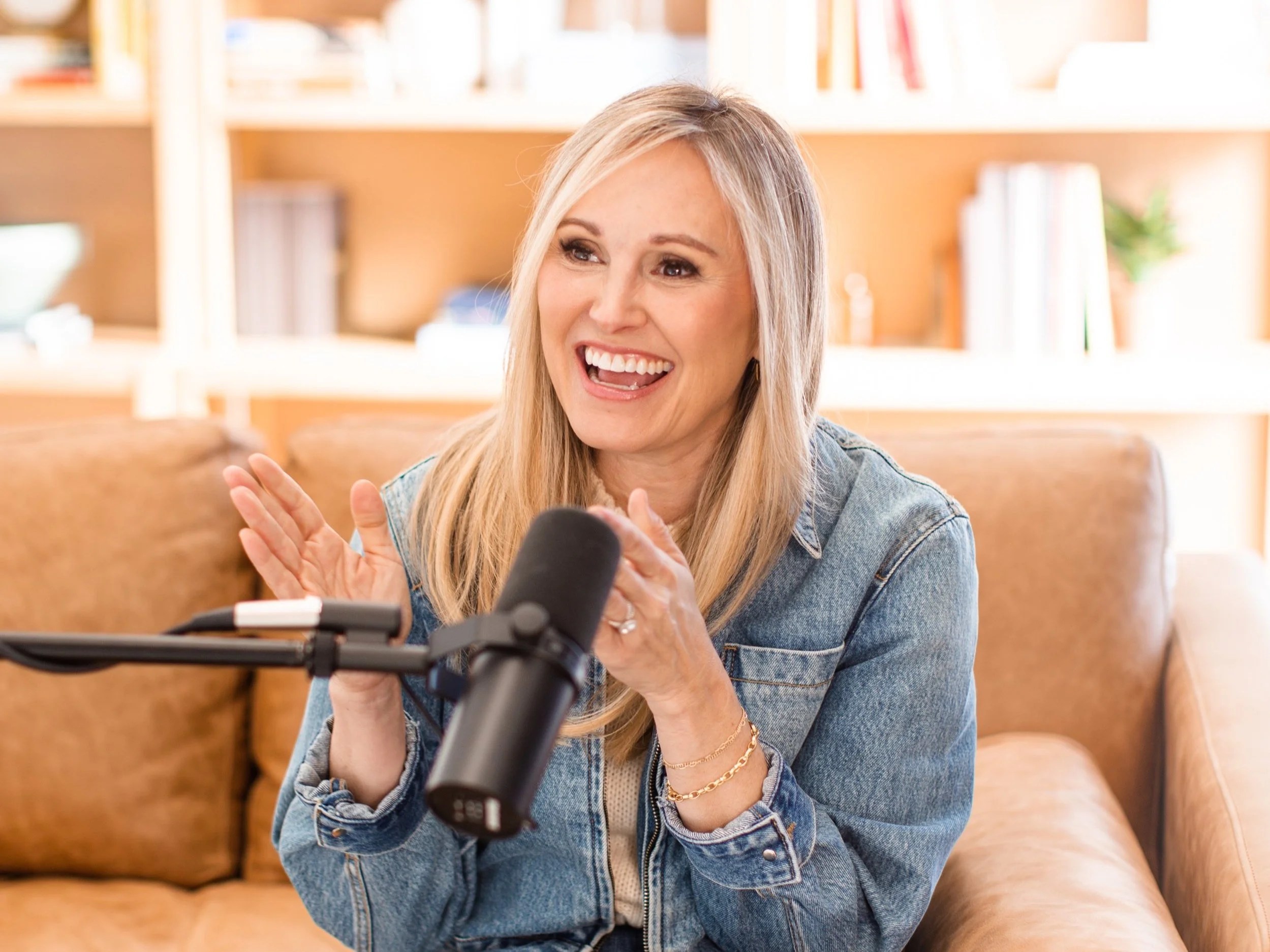Dependence on God in the Midst of Depression with Zac allen
My husband, Zac Allen, is one of the most outgoing people in the world.
He is joyful, fun, and thoughtful. I've never met anyone who doesn't like him. He has pastored a lot of people through many things. Even though he's no longer a pastor by title, he continues to pastor many people. This light appeared dimmed when he went through a long season of depression.
During that season, I felt like I was watching Zac just disappear. We were in the same house, but my husband was emotionally gone. His personality and capacity to care were gone. I was worried and afraid that I didn't know how to help. It was really scary because our whole world was spinning. I know this is a reality many families are facing. And so, we decided to revisit that season with Zac to see how he pulled through.
What did that season of depression look like for you, and where did it come from?
Zac: We were five years into planting the church in Austin. You had mentioned that you sensed that I was tired, but I don't think I admitted that. When God has given you a mantle of leadership, it doesn't matter how tired you are; you have to pastor. And so, I don't know if I gave heed to your words.
We merged our church with another church in Austin. It was a great win-win between two churches coming together. I stayed on as campus pastor but effectively handed over the mantle of leadership to another church. What I didn't see coming was a burnout type of crash. It felt like my brain just broke. I felt like I was sitting at the bottom of a murky lake, but I could not get to the surface. All I could do was look around.
For the first time, I experienced the depressive feelings the people I was pastoring had described. The only thing you can think when you're at the bottom of that murky lake is “I don't care.” You don’t care when making destructive decisions because you are not concerned about that. That's what depression and burnout looked like for me, and it hit me so suddenly.
How long did it last?
Zac: I went through nine months of intense depression, which happened in three stages. My brain broke. And so, I couldn't have a conversation. I couldn't look people in the eyes; I would avoid people. There was an “I don't care” stage. For three months, all I could say was “I don't care.” And I was just a dud.
Through the help of a great Christian psychiatrist, that first stage transitioned to a season of “now I care.” My psychiatrist prescribed medication to help me get to the surface of that murky water, but my brain was still broken. Although I wasn’t back to myself, I didn’t feel like that would be my life forever. There were three months of this stage. After those three months, there were glimpses of my usual self.
There's a real difference in who I am after that nine-month restoration.
When I was at the bottom of that murky lake, I still spoke to God.
I remember saying, “God, I don't know what I've done to get here. I don't know how long I'm gonna be here. Maybe it's forever.”
The most hopeful encouragement somebody gave to me during this season was that I’d be out of this one day. Those words were the only thing I had to hold on to because I had never been here before, and I couldn't imagine ever getting out.
There was a real desperation, work, and intentionality to find that healing. Could you share some of the resources you used?
Zac: When you're depressed, you're looking for people who have also gone through depression. It feels like everyone else hasn't experienced that depth of pain. And so, the only people who feel helpful are those who can identify with you during that season. That's not necessarily right, but that's how you feel when depressed.
I had two books that were my companions, including a diagnostic tool called ‘Leading on Empty’ by Wayne Cordeiro. Wayne listed the symptoms and risk factors of burnout. If you can identify the symptoms, then you can make course corrections. But if you don't make course corrections, you'll go through a crash. That book assured me that I wasn't crazy because I saw these symptoms in myself.
There was also the question: “where is my sin in this?” I was asking this question of God because I wanted to be right with Him. I wanted to grow, and I never wanted to be back in that position again.
I wanted to learn whatever He wanted to teach me through that season. As weird as this sounds, I wanted to get everything I could out of depression.
‘Christians Get Depressed Too’ by pastor David Murray gave me the answer. It's a 60-page booklet because depressed people don’t typically read much. Because he had been pastoring in Northern Ireland, where it’s rarely sunny, David dealt with a high depression rate in his congregation.
In the booklet, David said that it is rarely ever our gross obvious sin that gets us into depression. He said what led 95% of people into depression is a lack of selfcare. He said that we have denied the theology of the fall. When Adam fell, all his faculties fell. And he couldn't do everything for everybody all the time. Even though we're new creatures in Christ, we still have that fallen body, mind, and emotions.
For the first time, I recognized that I thought of selfcare as selfish because all I did was think of everybody else. The last thing I would think of doing was taking a sabbath and taking care of myself. My sin was the denial of the theology of the fall. That was the first time someone gave me a language that resonated my soul with what was going on and how I got there.
Talk to someone who might be spiraling or circling a season of depression, where they maybe feel checked out.
Zac: There's a myriad of reasons that people go through depression, whether they’re chemical or circumstantial. The internal and external causes of depression are not always in our control. During my season of depression, I read Lamentations 3 for nine months. In the first 20 verses, Jeremiah laments about his enemy on all sides. It was like all hope was lost, and he was getting to the end.
“My soul is bereft of peace. I've forgotten what happiness is. So I say, my endurance has perished, so has my hope from the Lord” – Lamentations 3:17-18.
That's how I felt, and I know there are people out there who are feeling the same. Verse 21 is why I had to read this chapter every day for nine months. It reads:
“But this I call to mind, and therefore I have hope. The steadfast love of the Lord never ceases. His mercies never come to an end; they are new every morning. Great is your faithfulness. The Lord is my portion, says my soul, therefore, I will hope in Him.”
When you're depressed, you can't think of anything beyond that day. And so, I’d encourage others to start committing Lamentations 3 to memory, or read it, because it's honest. It brings us back to the hope that God's not abandoning us. He's there with us. He still loves us, and His love never ceases.
What would you encourage spouses or friends of people who are going through depression to do?
Zac: When you're in this season, you don’t have enough self-confidence to make decisions or know what to do. You have to find someone to trust. You’ll have more confidence that they can help you get out of that murky lake.
For me, that person was Kevin Peck, the lead pastor at Austin Stone Community Church. He kept promising me that this would end. It was amazing how comforting and hopeful those simple words were. Kevin didn't know it wouldn’t last forever, but those words were powerful for me.
Can you discuss your medical and spiritual approach to healing?
Zac: I recognize how integrated we are with our bodies. Our emotions and souls are more interdependent than we may realize. Some of my healing would not have been possible if I hadn't done the bloodwork and panels with the endocrinologist to find out that I had some deficiencies. Granted, those deficiencies could have happened because of my season of depression. So, I needed to be under the care of an endocrinologist and a physician.
Some things aren't under our control in depression, but others are under our control.
And so, we must do what we can to take action on those things. God has gifted doctors with medicine. We have physical training and exercise. And so, it’s our responsibility to take care of what we can and trust God with everything He wants to do spiritually. It's your effort and still a dependence on what God's going to do.
A note from Jennie:
If you or someone you love is walking through a season of depression, remember that healing is gradual. It may take years of multiple medications, counseling, and many people holding you up, but there is hope. I hope you won't feel alone. If you do, find other people who have walked through it and found healing. My husband was blessed by the people who spoke into his life. You don’t do anything in isolation; you always bring people in.



